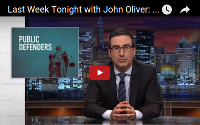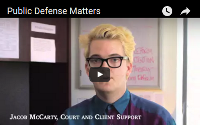Today, OPD joined 19 other organizations urging Louisiana governor John Bel Edwards to create an evidence-based and proactive plan to prevent and manage the spread of COVID-19 in prisons, jails, and juvenile facilities across the state. Health officials and experts continuing increasing their calls for social distancing in hopes of curbing further widespread spread of the virus. Jails and prisons remain prime breeding grounds for the virus risking the health, wellbeing and safety of thousands of Louisianas incarcerated in dozens of facilities. These people in the custody and care of the State of Louisiana remain at extremely high risk during this growing public health crisis.
The letter urged Governor Edwards and other officials to proceed swiftly. OPD has called for the Department of Corrections to release any and all people eligible for probation and/or parole and urgently provide hygiene items for those that remain in custody. Louisiana maintains one of the largest populations of incarcerated people and many are elderly, immunocompromised, or extremely vulnerable at best.
Additionally, a comprehensive list of recommendations were offered:
1. Compliance with Centers for Disease Control (CDC), Louisiana Department of Health, and National Commission on Correctional Health care (NCCHC) Guidelines. We urge you to be in regular contact with experts at the CDC, the Louisiana Department of Health, and National Commission on Correctional Health Care (“NCCHC”). The NCCHC has issued guidelines accessible here: https://www.ncchc.org/blog/covid-19coronavirus-what-you-need-to-know-in-corrections. We understand that prison-specific, COVID-19 guidelines are likely forthcoming from the CDC.
2. Education of the People in Your Custody. People housed in prisons and jails need to be informed about the virus, its symptoms, and the measures they can take to minimize their risk of contracting or spreading the virus. They must be educated on the importance of proper handwashing, coughing into their elbows, and social distancing to the extent they can. Information about the spread of the virus, the risks associated with it, and prevention and treatment measures must be based on the best available science.
3. Education of the Staff. Correctional, administrative, and medical staff all must be educated about the virus to protect themselves and their families, as well as the people in their custody.
4. Keeping Infected Staff and Visitors Out of Facilities. COVID-19 will most likely be introduced to jails and prisons by staff or other visitors. Measures must be in place to verify that all individuals entering facilities do not have symptoms of COVID-19, have not had contact with anyone known to have the illness, and have not recently traveled to the location of an outbreak, and that preventive measures are in place to reduce infection, such as handwashing and taking the temperatures of all staff or others who enter the facility.
5. Order the Department of Corrections to Lift and Cease Placing Probation and Parole Holds for Violations Where No Immediate and Significant Risk Is Posed to the Community. There are hundreds of people currently in Louisiana prisons for probation and parole violations, many for technical violations like socializing with disreputable people, not paying fees, failure to obtain a job, or missing group. Imprisonment for violations like these has not been shown to reduce recidivism, thereby making the community safer, and in fact, will make the community less safe by exposing more people to this potentially deadly virus. Probation and parole officers arrest people and issue holds on violations as ordered by DOC policy. But they do not have to. The Secretary of the Department of Public Safety and Corrections, James Le Blanc, serves at your pleasure. To protect us all, please order the DOC to lift all probation and parole holds for technical violations, and to cease placing such holds on people until further notice. Additionally, the DOC should not place probation or parole holds, whether for technical or non-technical violations, on people unless there is clear evidence that them remaining in the community would present an unreasonable risk to the physical safety of the community. We also request that, until the pandemic is over, you issue guidance making clear that a new misdemeanor or non-violent arrest should not trigger parole detention.
6. Precautions Regarding—Including Release of—Medically Fragile and Older Adults and Children from Prison and Secure-Care Facilities. Prisons house large numbers of people at extreme risk of serious symptoms, complications, and death from COVID-19. This includes older adults; people with chronic illnesses, complex medical needs, compromised immune systems, or disabilities; and pregnant women. Systems and facilities should take additional precautions to prevent illness among these high-risk populations. To the maximum extent possible, this should include releasing them from prison. Releasing these high-risk populations will reduce the need to provide complex, expensive medical care or transfers to hospitals when staff will be stretched thin. Further, to the extent authorized by law, the Governor’s office should make all efforts to facilitate the release of detained children to their families during this national emergency unless there is clear evidence that release would present an unreasonable risk to the physical safety of the community.
7. Immediate Release of Individuals in Pre-trial Detention Absent Substantial Showing of Imminent Dangerousness to Community. State leaders should never forget that local jails are even less equipped to handle pandemics than state prisons, so it is even more important to reduce the burden of a potential pandemic on jails. Individuals in jails face a substantial risk of infection and death due to their inability to access adequate health care, the frequency of transport to court, and the significant traffic from the public into jails by staff, lawyers, and others. The Governor should seek the cooperation of sheriffs and the courts to expedite the release of persons whose pretrial detention is not necessary to secure public safety. Without a substantial showing of imminent dangerousness, people held in pretrial detention should be released especially if they are elderly, have underlying health conditions that compromise their immune systems, or are charged with misdemeanor or non-violent offenses.
8. Staffing Plans. Regardless of how many staff stay home because they are sick, prisons will continue to function. There must be a plan for how necessary functions and services will continue if large numbers of staff are out with the virus in order to ensure adequate health care, access to programs and services, and the safety and care of individuals detained. There must also be a plan for ensuring that staff are required to stay home if they are ill or exposed to COVID-19 to avoid spreading the virus among incarcerated populations.
9. Staffing Plans for Services Provided by Incarcerated People. Many tasks in facilities, such as food preparation and basic sanitation, are performed by incarcerated people. The plans for an outbreak must address how these necessary tasks performed by incarcerated people will continue if large numbers of incarcerated people are ill or exposed to COVID-19. There must be plans in place to regularly screen incarcerated people for illness or exposure to COVID-19 and, if necessary, to remove them from any job that places them in contact with other individuals or with food or other items that will be distributed. Individuals who perform job duties who become ill or can otherwise not work due to showing symptoms should also be compensated for lost work time.
10. Free Access to Hygiene Supplies. The most basic aspect of infection control is hygiene. There must be free and unsupervised access to warm water and adequate hygiene supplies, both for handwashing and for cleaning, throughout facilities, and including hand soap, hand sanitizer, and other supplies as needed. There must be adequate access to free tissue for nose-blowing, trash cans that are emptied regularly, and clean laundry. Access must be freely available both to incarcerated people and to all others, including staff and visitors, throughout facilities.
11. Screening and Testing of the People in Your Custody. The plan must include guidance, based on the best science available, on how and when to screen and test people in your facilities for the virus.
12. Housing and Treatment of Persons Exposed to or Ill With COVID-19. The plan must describe how and where people in the detention system will be housed if they are exposed to the virus, become sick with it, or are at high risk if exposed to it. Healthcare providers should consult with local or state health departments to determine whether patients meet criteria for a Persons Under Investigation (PUI) status. Providers should immediately notify infection control personnel at their facility and the nearest hospital if they suspect COVID-19 in a patient. Courses of treatment for anyone exposed to or ill with COVID-19 must be evidence-based, available immediately, and in compliance with scientifically-based public health protocols.
13. Family Notification. Systems and facilities should adopt procedures that provide for regular, accurate, and timely updates about the health status of individuals who are ill with COVID-19, with the consent of the affected individuals and consistent with HIPAA requirements.
14. Co-Pays. The practice of charging incarcerated people co-pays, even nominal ones, for medical treatment discourages sick people from seeking care and allows disease to spread inside facilities. Co-pays must cease in order to avoid extensive, costly, complicated outbreaks and unnecessary illnesses. At a minimum, co-pays should be waived until the COVID-19 pandemic has ended, and that policy should be clearly communicated to incarcerated people. It is critical that financial barriers do not prevent anyone with a suspected COVID-19 infection from receiving immediate, appropriate medical care.
15. Data Collection: The collection of data regarding COVID-19 will be part of the public health response. As with any contagious disease, data collection is critical to understanding and fighting the virus. The correctional system must be part of this process. The same information that is tracked in the community must be tracked in facilities. The plan should include mechanisms for providing timely data to state, local, and federal health authorities.
16. Access to Communication. Systems and facilities must make every effort to protect and preserve incarcerated people’s ability to communicate with their friends and family on the outside. Fees ordinarily charged for phone and videoconference calls should be waived if in-person visitation is limited. Videoconferencing should also be made available at those facilities where it is currently unavailable.
17. Access to Legal Counsel. Systems and facilities must ensure incarcerated people have free, confidential, timely access to legal counsel and law libraries. This includes in-person visitation, when counsel indicates the meeting is necessary, to the extent possible, and ample videoconference and telephone communications which would not be recorded for any purpose. Further, facilities must ensure that detained and incarcerated people can meaningfully contribute to their legal cases—for example, by being able to transmit and sign confidential documents, even if in-person visitation is limited.
18. Avoid Lockdowns. Although corrections staff may be tempted to reflexively cut off visitation and increase the use of solitary confinement to control the spread of COVID-19, any system or facility-wide lock-down or interruptions in regular activities, such as exercise or visits and phone calls with families or attorneys, should be based solely on the best science available and should be as limited as possible in scope and duration to ensure the health and safety of individuals in custody. Prolonged lockdowns can inflict substantial, serious mental harm on incarcerated populations, exacerbating feelings of stress and anxiety amongst those in custody who are deprived of regular contact with their friends and family. International experts consider prolonged solitary confinement to be torture; it can cause serious, persistent, sometimes permanent damage to mental health. Moreover, unnecessary lockdowns and solitary confinement do nothing to mitigate the risk of COVID-19 exposure from the daily influx of facility staff, vendors, medical professionals, and others. Finally, when locked down or held in solitary confinement, people may not be able to alert staff promptly if they experience symptoms of COVID-19, increasing the risk of contagion.
19. Coordination to ensure healthy transition. It is also crucial that your office coordinate with community housing and healthcare providers to prepare for the release of incarcerated people back into the community. Such efforts will not only protect people who are released but also further reduce community spread overall.
20. Publication of Information and Policies Adopted in Response to COVID-19. All plans adopted to address the risks and impacts of COVID-19 should be transparent and clearly communicated to the public and to incarcerated people. This includes providing regular updates, via press releases and on the system or facility website, about the spread of the virus and the measures being taken to address it. Officials should have a plan to address an anticipated increase in the number of calls from family members seeking information. Facilities should provide regular daily public updates on the number of cases and any fatalities.
Additional Recommendations for People in DOC custody or serving time in local jails:
1. Extend good-time credit. In order to reduce exposure, DOC should issue an emergency 90-days good time credit to allow the release of anyone within 90 days of going home.
2. Sign clemency applications on your desk. Numerous clemency applications are currently pending your review and approval. Many of these individuals are likely medically vulnerable to COVID-19. We ask that you immediately sign those clemency petitions.
Additional Recommendations for Pretrial Detention:
1. Lower jail admissions to reduce “jail churn.” Because of the shorter length of stay in jails, more people churn through jails in a day than are admitted or released from state and federal prisons in two weeks. There are many ways for state leaders to reduce jail churn, for example, by: a) reclassifying misdemeanor offenses that do not threaten public safety into non-jailable offenses; b) using citations instead of arrests for all low-level crimes; and c) diverting as many people as possible to community-based mental health and substance abuse treatment.
Additional Recommendations Regarding the Detention of Children:
1. Instruct OJJ to file motions for release of juveniles who pose no imminent and substantial danger to the community. Children in detention face a substantial risk of harm during pandemics. OJJ has the authority to request that juvenile court judges release individuals from secure care. We request that you instruct OJJ to file such motions to ensure that children are kept out of harm’s way.
2. Extending furlough. The Governor’s office should instruct OJJ to seek furloughs for children and also to extend furloughs for children who are already on furlough.
Additional Recommendations Regarding Parole and Probation:
1. Reduce unnecessary parole and probation meetings. People deemed “low risk” should not be required to spend hours traveling to, traveling from, and waiting in crowded lobbies of administrative buildings for brief meetings with their parole or probation officers. Discharge people who no longer need supervision from the supervision rolls and allow as many people as possible to check in by telephone.
See the attached document for the full text of the letter.





